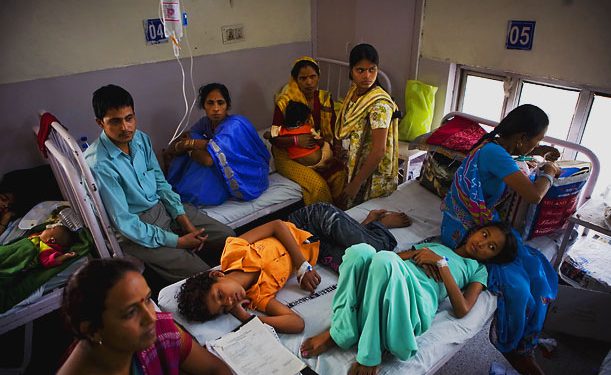|
Listen to article
Getting your Trinity Audio player ready...
|

India is struggling with morbidity and mortality due to COVID-19 with a test positivity rate around 25 % with more than 200,000 Indians losing their lives since the start of the pandemic more than one year ago. Data verification could be a matter of debates between various stakeholders, however, everyone can feel the heat of pyres across the cities. This health emergency has again exposed the Indian health systems at all dimensions- from the state of health workers, medical facilities, medicines and related supplies, equipment, and privacy of data, information and systems, all failed to ensure health security to its people. The unpreparedness was highlighted with sheer ignorance of global trends, failure of timely forecasting, lack of coordination and communication between stakeholders even chaotic differences of opinions, strategy, and miscommunication between central and state governments. Weak Vaccine management faced failures at various levels, starting from hesitancy, procurement, distribution and vaccine market mechanisms.
Not taking lessons from the previous catastrophic COVID wave, leaders are still unprepared to effectively detect, assess, report, and respond to potential health threats. The direct or indirect threat posed by infectious diseases to Indian national security and public health can no more be ignored.
The nation needs a commitment to strengthen health security, perhaps an act with potential to decentralize and empower central, states and civil society by providing a framework with defined protocols, and standards, establishing financing and coordinating networks with precise roles on responsibility and accountability.
According to evolving health challenges and available science and technology the presently available tools in the Indian Constitution like epidemic act, national disaster act are not holistic nor definitive. Hence India needs an integrative National Health Security bill based on a national health security agenda along with a coordinated strategy to prevent future health emergencies. The national health security bill would codify the response efforts for public health across the nation, including the investments for building capacity without political biases and discrimination. Without a national health security act, India will remain vulnerable, unprepared for the next pandemic, disease outbreak and related catastrophes. Such an act will enshrine a framework for India’s national health security policy with designated officials responsible and accountable for coordinating disease prevention, mitigation and counter response with a strategic protocol advised by the Global Health Security Agenda (GHSA), World Health Organization (WHO), Biological weapon convention Implementation support unit (BWCISU) etc.
The bill will seek to empower various stakeholders, including central government, state governments, district and village administrations and non-governmental organisations (NGOs). It will develop governing guidelines for central government on finance policy framework, building centralized database and central decision command and provide guidance to state government and locals on finance, policy implementation, communication & awareness and health security data base preparation.
The National Health Security Act would intend to:
- Build an inter-agency expert review committee for coordinating the national health security responses at all times. The multisectoral committee engaging experts from medical, science and security will brainstorm to find the gaps and build capacity to manage evolving infectious disease threats. The goal is to elevate the health security agenda as a national priority. The chairman of this committee, the National Health Security Advisor (NHSA) can act as special adviser to NSA, a single point person for efficient coordination and communication management.
2. Institutionalize National health security responses and activities through law and not the executive advisories and orders.
3. Prescribe provisions for regulation of critical points like Surveillance vs Right to Privacy, Quarantine vs Right to freedom of movement and Vaccination vs Religious freedom etc.
4. Become a new holistic, integrative tool in the arsenal of Indian Constitution which seeks to update and upgrade epidemic act, national disaster act etc related to national health security.
5. Build early medical emergency forecasting system-research consortia for genomic surveillance and clinical aspects to predict, detect, understand and address outbreaks. Create a statewise health security visualization dashboard based on the risk assessments, preparedness levels and efforts required for capacity building to prevent, detect, and respond to forecasted health emergencies. This dashboard will help the national leaders, local leaders, community health forces, NGOs to prepare and act timely and efficiently.
6. Build research capacity for surveillance of changing patterns of infectious diseases in plants, animals, environment and their risk of transmission in humans.
7. Building resources and systems for development and equitable distribution of vaccines and therapies for emerging disease.
8. Build systems for facilitating rapid research and development of repurposed drugs and universal vaccines that could be effective against novel strains.
9. Build trained community health workforces that would build trust and supplement health system measures at grass roots.
10. Establishing IT enabled communication and education networks. Regulation of online media on disinformation and fake news.
11. Enforce advisories on proper use of antibiotics and monitor the antimicrobial resistance patterns to reduce incidences of novel, antibiotics- resistant strains.
12. Minimize the risk of disease outbreaks by efficient implementation of national immunisation programs.
Better late than never, leaderships across health, science and security must take an initiative and bolster the Indian government by designing a coordinated strategy to prepare for future health emergencies like pandemics.
To sum up, for protecting the health and well being of all Indians, the government must bring a new holistic National Health Security Act that will decentralise and empower all the stakeholders, centre, states, civil society, and hence the nation to prepare for future health emergencies.






Add comment